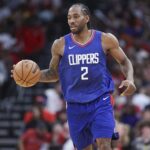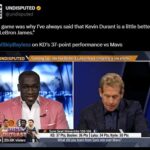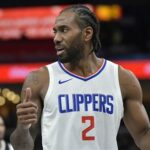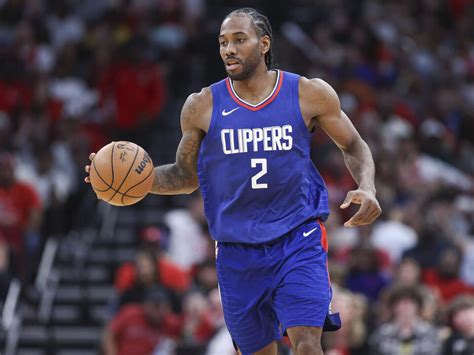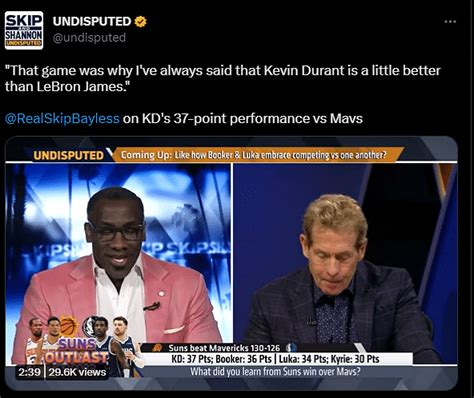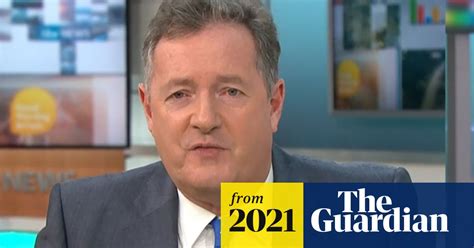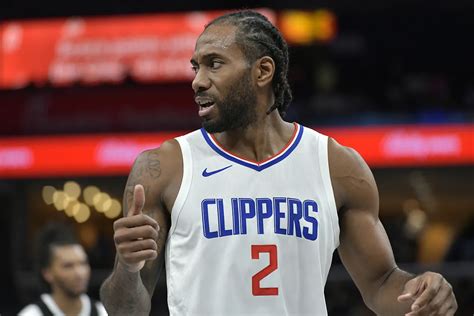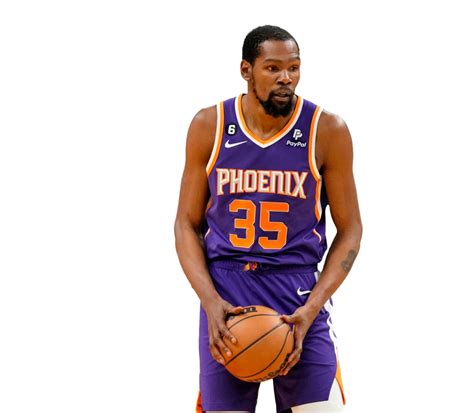
NBA Commissioner Adam Silver is reportedly “livid” at the circumstances surrounding Mat Ishbia’s takeover of the Phoenix Suns, specifically concerning the Kevin Durant trade, according to sports analyst Skip Bayless. Bayless claims Silver is angered by the perception that Ishbia, just weeks after becoming owner, orchestrated a blockbuster trade that significantly altered the competitive landscape of the league.
Skip Bayless, on a recent episode of “Undisputed,” stated that NBA Commissioner Adam Silver is “extremely angered” by the circumstances surrounding the Phoenix Suns’ acquisition of Kevin Durant. Bayless alleges Silver feels Ishbia, in his short tenure as owner, leveraged his position to force through a trade that disproportionately benefits his team, potentially undermining the league’s competitive balance.
“I have been told, I can’t reveal my source, but I have been told that Adam Silver was livid,” Bayless claimed. “He was extremely angered by what just happened in Phoenix. That a new owner, barely sworn in, can wheel and deal and leverage his way to getting Kevin Durant on his team.”
Bayless’s comments suggest Silver believes the speed and aggressiveness of Ishbia’s actions, especially given his newness to the ownership role, raise questions about the integrity of the trade process and the potential for undue influence. The commissioner’s alleged frustration highlights the complexities and potential pitfalls of new ownership injecting itself into significant basketball decisions so quickly.
The Durant trade, which sent Mikal Bridges, Cam Johnson, Jae Crowder, and multiple first-round picks to the Brooklyn Nets, immediately positioned the Suns as a top contender in the Western Conference. While such trades are commonplace in the NBA, the timing and circumstances of this particular deal, coupled with Ishbia’s recent arrival, have apparently raised eyebrows within the league office.
The alleged anger from Silver underscores the tension between allowing owners to manage their teams as they see fit and maintaining a level playing field to ensure the league’s long-term health and competitiveness. This situation also raises questions about the informal power dynamics between owners and the commissioner’s office.
Bayless further elaborated on the potential reasons for Silver’s discontent, suggesting that the commissioner might be concerned about the precedent set by Ishbia’s actions. The fear is that other new owners might attempt similar aggressive moves, potentially destabilizing the league and creating an environment of constant roster upheaval.
“It just looks like a new owner came in and said, ‘I’m going to throw my weight around and get what I want,'” Bayless said. “And that’s not a good look for the league.”
While Bayless’s claims remain unconfirmed by official sources within the NBA or the Commissioner’s office, they have generated significant discussion and speculation among fans and analysts alike. The allegations of Silver’s displeasure add another layer of intrigue to the already captivating narrative surrounding the Phoenix Suns and their quest for a championship.
The NBA has yet to officially comment on Bayless’s report. However, if true, Silver’s frustration could lead to increased scrutiny of future trades and ownership decisions, potentially impacting the way teams operate in the league. The situation also highlights the delicate balance the commissioner must maintain between fostering competitive environments and respecting the autonomy of team owners.
The Kevin Durant trade to Phoenix was a seismic shift in the NBA landscape, creating a team many immediately pegged as a favorite to win the championship. The Suns already had Devin Booker and Chris Paul, and adding a talent like Durant put them over the top, at least on paper. However, acquiring such a player comes at a cost, and the Nets received a massive haul of players and draft picks, effectively kickstarting their own rebuild. The rapid nature of this trade, occurring shortly after Ishbia’s arrival, is seemingly what has raised concern.
The Suns’ aggressive pursuit of Durant signaled a clear intention to compete for a championship immediately. Ishbia, wasting no time in making his mark, demonstrated a willingness to invest heavily in the team’s success. This approach, while exciting for Suns fans, has apparently caused ripples within the league’s hierarchy.
The issue, according to Bayless’s source, isn’t necessarily the trade itself, but the optics of a new owner wielding his influence so quickly and decisively. The fear is that this could encourage similar behavior from other owners, leading to a league where financial resources and owner influence play an outsized role in determining competitive outcomes.
This situation presents a complex challenge for Adam Silver. He must balance the need to maintain a level playing field with the rights of owners to manage their teams as they see fit. Any overt action taken against the Suns could be perceived as unfair or arbitrary, while inaction could be seen as tacit approval of the behavior that allegedly angered him in the first place.
The NBA has a history of navigating such situations, often relying on behind-the-scenes communication and subtle adjustments to league rules to address concerns. It remains to be seen how Silver will ultimately handle this situation, but it is clear that the Kevin Durant trade and Mat Ishbia’s arrival have created a new dynamic within the league.
The potential ramifications of this situation are significant. If Silver feels strongly that Ishbia’s actions were inappropriate, he could potentially implement stricter guidelines for new owners or increase scrutiny of trades involving recently acquired teams. He could also use his influence to discourage similar behavior in the future, sending a message that such aggressive moves will not be tolerated.
However, taking a heavy-handed approach could also backfire, alienating owners and creating resentment towards the league office. Silver must carefully weigh the potential consequences of his actions and strive to find a solution that addresses the concerns without stifling competition or infringing on the rights of team owners.
Ultimately, the success of the Phoenix Suns and the long-term impact of the Kevin Durant trade will likely play a role in shaping the narrative surrounding this situation. If the Suns go on to win a championship, it could be argued that Ishbia’s aggressive moves were justified. However, if the team falters or the trade proves to be a disaster for the Nets, it could reinforce the concerns about the potential dangers of unchecked owner influence.
The saga involving Mat Ishbia, the Kevin Durant trade, and Adam Silver’s alleged displeasure underscores the complex interplay of power, money, and competition within the NBA. It is a situation that warrants close attention and could have a lasting impact on the league’s future.
The report by Skip Bayless, while unconfirmed by official NBA sources, has ignited a firestorm of discussion about the implications of new ownership leveraging influence for immediate roster upgrades and the potential impact on league parity. Bayless’s assertion that Commissioner Silver is “livid” throws a spotlight on the delicate balance between allowing team owners autonomy and maintaining a level playing field for all franchises.
The speed at which Ishbia orchestrated the Durant trade, just weeks after assuming ownership, appears to be a key factor in Silver’s alleged frustration. Such rapid action raises questions about whether Ishbia adhered to the spirit of fair competition and whether the Nets received adequate value in return, considering the circumstances.
The trade itself, which sent Mikal Bridges, Cam Johnson, Jae Crowder, four unprotected first-round picks, and a 2028 pick swap to Brooklyn, was undeniably a massive haul. However, the timing and the perceived imbalance of power between a new owner eager to make a splash and a team potentially vulnerable due to Durant’s trade request have fueled concerns about the integrity of the process.
The NBA’s constitution grants team owners significant autonomy in managing their franchises, including making personnel decisions. However, the commissioner’s office also has a responsibility to ensure that all teams operate within the bounds of fair play and that no single owner or group of owners exerts undue influence over the league’s competitive landscape.
Silver’s alleged anger suggests that he may believe Ishbia’s actions crossed a line, potentially setting a dangerous precedent for future ownership transitions. The fear is that other new owners, emboldened by Ishbia’s example, may attempt similar aggressive moves, leading to a league characterized by constant roster turnover and a widening gap between the “haves” and “have-nots.”
The situation presents a delicate challenge for Silver. He must address the concerns raised by Ishbia’s actions without appearing to arbitrarily punish the Suns or infringe on the rights of team owners. A potential course of action could involve clarifying league rules regarding new ownership and trade practices, emphasizing the importance of fair negotiation and transparency.
Furthermore, Silver could use his influence to encourage open communication between owners and the league office, fostering a culture of collaboration and mutual respect. By promoting dialogue and addressing concerns proactively, the NBA can mitigate the risk of future controversies and ensure that all teams have a fair opportunity to compete.
The reaction from other team owners will also be crucial. If a significant number of owners share Silver’s concerns, they may be more likely to support stricter regulations or other measures to prevent similar situations from arising. However, if owners view Ishbia’s actions as simply smart business, Silver may face resistance in his efforts to address the issue.
The long-term implications of the Durant trade and the controversy surrounding it are difficult to predict. If the Suns go on to win multiple championships, Ishbia’s actions will likely be viewed as a masterstroke. However, if the team fails to live up to expectations or if the trade ultimately proves detrimental to the Nets, the concerns about owner influence and league parity will likely persist.
The NBA’s ability to navigate this situation will be a test of its leadership and its commitment to maintaining a fair and competitive environment for all teams. Silver’s response will be closely watched by owners, players, and fans alike, as it will set the tone for how the league addresses similar issues in the future.
The situation highlights the fundamental tension between the desire for competitive balance and the inherent advantages enjoyed by teams with wealthy owners and desirable markets. While the NBA strives to create a level playing field through measures like the salary cap and the draft, the reality is that some teams will always have an edge due to their financial resources and geographic location.
The challenge for the NBA is to mitigate these advantages without stifling competition or discouraging owners from investing in their teams. This requires a delicate balancing act, and there is no easy solution. However, by promoting transparency, fostering open communication, and enforcing fair play, the league can strive to create an environment where all teams have a chance to succeed.
The Kevin Durant trade to the Phoenix Suns was a clear indication that the team was “all-in” on winning a championship. The new owner, Mat Ishbia, made a bold statement by trading away significant assets to acquire a player of Durant’s caliber. While the trade was undoubtedly exciting for Suns fans, it also raised questions about the potential impact on the league’s competitive balance.
The Nets, on the other hand, received a substantial package of players and draft picks that will allow them to rebuild for the future. However, some observers have questioned whether the Nets received fair value for Durant, considering his status as one of the league’s top players. The timing of the trade, coming shortly after Ishbia took over as owner, has also raised eyebrows.
The allegations that Commissioner Silver is “livid” about the situation suggest that the league office is concerned about the precedent that Ishbia’s actions may set. The fear is that other new owners may be tempted to make similar aggressive moves, potentially leading to a league where financial resources and owner influence play an even greater role in determining competitive outcomes.
The NBA has a long history of dealing with such issues, and it will be interesting to see how the league responds to this situation. Silver has a reputation for being a strong and decisive leader, and he is likely to take steps to address the concerns that have been raised. This could involve clarifying league rules, increasing scrutiny of trades involving recently acquired teams, or simply using his influence to discourage similar behavior in the future.
Ultimately, the success of the Phoenix Suns will likely be the deciding factor in how this situation is viewed. If the Suns go on to win a championship, Ishbia’s actions will be seen as a brilliant move. However, if the team falters, the concerns about owner influence and league parity will likely persist.
The NBA faces a complex challenge in balancing the desire for competitive balance with the rights of team owners to manage their franchises as they see fit. It is a challenge that requires careful consideration and a willingness to adapt to changing circumstances. The situation involving Mat Ishbia and the Kevin Durant trade is just the latest example of this ongoing tension, and it will be interesting to see how the league navigates this delicate situation.
The reported discontent of Adam Silver with the Suns’ quick acquisition of Durant under new ownership adds another layer to the conversation about competitive balance within the NBA. While the acquisition undoubtedly elevates the Suns’ championship aspirations, the perceived ease and speed with which it transpired have seemingly irked the Commissioner.
The core issue appears to be the optics of a new owner immediately leveraging his position to acquire a superstar, potentially disrupting the existing competitive landscape. The concerns revolve around whether this sets a precedent for future ownership changes, leading to a league driven more by the deep pockets of owners than organic team development and strategic player acquisition.
The counterargument is that owners have the right to manage their teams as they see fit, and if Ishbia saw an opportunity to improve the Suns’ roster and championship chances, he was within his rights to pursue it. This perspective aligns with the capitalist nature of professional sports, where teams are essentially businesses striving for success, and aggressive strategies are often rewarded.
However, the NBA operates under a framework of competitive balance, designed to prevent any single team or group of teams from dominating the league indefinitely. Measures such as the salary cap, the draft, and revenue sharing are all intended to level the playing field and ensure that all teams have a reasonable chance to compete.
The fear, as suggested by Bayless’s report, is that Ishbia’s actions could undermine these efforts by demonstrating that a new owner can quickly circumvent the existing mechanisms and acquire a championship-caliber team through sheer financial power and influence.
Silver’s alleged “livid” reaction underscores the importance of maintaining the integrity of the competitive balance framework. As commissioner, he has a responsibility to ensure that all teams operate within the spirit of the rules and that no single team gains an unfair advantage.
While it is unlikely that the NBA will take any drastic action against the Suns, the situation could lead to increased scrutiny of future ownership changes and a greater emphasis on enforcing the existing competitive balance measures. Silver may also use his influence to discourage other owners from pursuing similar strategies, emphasizing the importance of building teams through sustainable methods.
The long-term impact of the Durant trade and the controversy surrounding it remains to be seen. If the Suns win a championship, it could be argued that Ishbia’s actions were justified. However, if the team fails to meet expectations or if the trade proves detrimental to the Nets, the concerns about owner influence and league parity will likely persist.
The NBA faces a delicate balancing act in navigating this situation. It must uphold the principles of competitive balance while also respecting the rights of team owners to manage their franchises as they see fit. The outcome of this situation will have a significant impact on the league’s future and will be closely watched by owners, players, and fans alike.
The controversy surrounding the Durant trade highlights the increasing power and influence of NBA owners. In recent years, we have seen a growing trend of owners taking a more active role in team decisions, often overriding the recommendations of their general managers and coaches.
This trend has been fueled by the increasing value of NBA franchises and the desire of owners to maximize their investment. As a result, we have seen a number of high-profile trades and signings that have been driven more by owner ambition than by sound basketball strategy.
While it is understandable that owners want to see their teams succeed, it is important to remember that they are ultimately responsible for the long-term health of the league. If owners become too focused on short-term gains, it could undermine the competitive balance and ultimately harm the product.
The NBA must find a way to rein in the power of owners without stifling their creativity and innovation. This will require a delicate balancing act, but it is essential for the long-term success of the league.
Frequently Asked Questions (FAQ):
1. Is there official confirmation that Adam Silver is “livid” about the Suns’ acquisition of Kevin Durant?
No, the report of Adam Silver’s anger originates from Skip Bayless on “Undisputed,” citing an unnamed source. There has been no official confirmation from the NBA or the Commissioner’s office regarding this claim. This is according to Bayless, who stated “I have been told, I can’t reveal my source, but I have been told that Adam Silver was livid.”
2. What specific concerns might Adam Silver have regarding the trade?
The alleged concerns center around the speed and circumstances of the trade shortly after Mat Ishbia became the Suns’ owner. The worry is that Ishbia leveraged his position to force the trade, potentially undermining the league’s competitive balance and setting a precedent for other new owners to aggressively pursue similar moves, says Bayless “It just looks like a new owner came in and said, ‘I’m going to throw my weight around and get what I want,'”
3. What did the Suns give up in order to acquire Kevin Durant?
The Suns traded Mikal Bridges, Cam Johnson, Jae Crowder, four unprotected first-round picks, and a 2028 pick swap to the Brooklyn Nets in exchange for Kevin Durant and T.J. Warren. This is a significant haul of assets, particularly the unprotected first-round picks, which give the Nets flexibility in their rebuild.
4. How might the NBA address these concerns if they are valid?
Potential actions could include clarifying league rules regarding new ownership and trade practices, increasing scrutiny of trades involving recently acquired teams, and emphasizing the importance of fair negotiation and transparency. Silver could also use his influence to discourage similar behavior in the future.
5. What is the potential long-term impact of this situation on the NBA?
The long-term impact depends on the Suns’ success and how the NBA handles the situation. If the Suns win a championship, the trade might be viewed as a masterstroke. However, if they fail, concerns about owner influence and league parity could persist. The NBA’s response will set a precedent for how similar situations are handled in the future.
